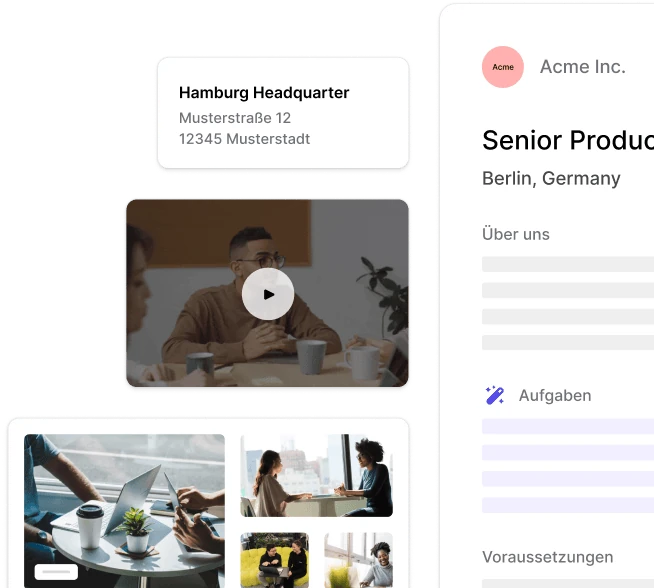Glossary: HR & Recruiting Definitions
What is the screening process in recruitment?
The screening process determines if a job applicant is qualified for the role and a potential fit for the position for which they applied.
The screening process consists of several elements, most commonly:
- Screening questions on the job application form
- Resume screening to shortlist interview candidates
- Interview screening, including phone or video screening interviews and in-person interviews
- Candidate assessments via skill-based, cognitive, or behavioural tests
- Background screening and/or reference checks
Below, we run you through all the steps of the screening process. You’ll find answers to the following questions:
Table of contents
What are applicant screening questions?
Applicant screening questions, which are short and direct and most often included in an online application form, quickly filter out applicants who do not meet a job post’s minimum requirements.
Using applicant pre-screening questions helps speed up the hiring process and is part of the first steps in whittling down the applicant pool. They are especially useful if a job post is expected to deliver a large volume of applications or when hiring for very specific skills.

There are two main types of applicant screening questions: eligibility screening questions and performance-related screening questions. Here is a quick breakdown of the most commonly asked questions of each type:
Eligibility screening questions
- Start date: Is the candidate available in the right time frame?
- Location: Is the candidate able to be present in the required location?
- Employment status: Is the candidate legally allowed to perform the job?
- Compensation: Does the candidate’s salary expectation align with the budget?
Performance screening questions
- Education: Does the candidate fulfil the minimum requirements?
- Certifications: Does the candidate hold the proper certificates or licenses?
- Experience: Does the candidate have a suitable work history and experience level?
- Skills: Does the candidate speak the right languages, or are they proficient in the required software?
What are resume and cover letter screening?
An employer can manually screen applicant resumes and cover letters for a set of criteria, but using automated resume screening tools has become more common.
For example, Applicant Tracking Software can screen resumes for keywords or automatically compare resumes to job descriptions to identify the best matches.
What is candidate screening?
The pool of applicants narrowed down by application screening questions and resume screening still requires further evaluation. Thus, the initial candidate screening phase begins, creating a shortlist from the remaining applicants to move on to the interview process.
Candidates will continue to be screened during the interview process until a final hiring selection is made.
What is a screening interview?
After shortlisting candidates, the next step is to further narrow the pool with a brief screening interview.
In most cases, screening interviews are conducted by telephone and last no longer than thirty minutes. The questions asked in an initial phone screening interview aim to:
- Verify educational background and work history
- Vet the strength of skills and qualifications stated on their resume
- Confirm start date availability
- Firm up salary expectations
What is assessment screening?
Some organisations include assessment tests in their screening process.
Sometimes, these are part of a pre-screening process, while other times, they are used to narrow down the candidate pool before or after the first or second round of interviews. The kind of assessment screening used will vary on the role.
An assessment tool, as included in JOIN’s recruitment software, allows you to easily create custom assessments and tests to screen candidates more effectively.
Skills test
Skills tests are best suited to technical roles. They determine whether a candidate is objectively able to do the job or not. They are a quick way to identify which candidates possess the hard skills to meet the requirements.
Case study
For non-technical roles, candidates often have to complete a case study assignment to demonstrate their work approach.
For example, candidates might need to create a presentation detailing and explaining the methods and means they would use to achieve an aspect of the job.
What is background screening?
In some cases, before making an offer, an employer will run a background check to verify the candidate is legally eligible for the job.
If a formal background check is unnecessary, an employer might opt to check the candidate’s references or screen their online presence for any red flags.
Free recruiting software that helps you hire faster
Find out for yourself how we help you attract, screen, and manage the best talent to grow your team.
Get started for freeRelated terms


